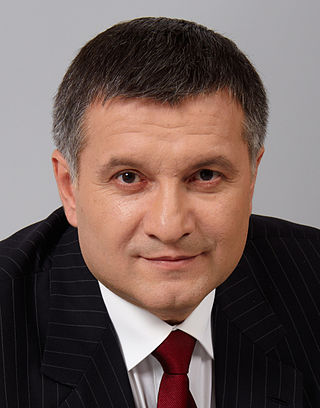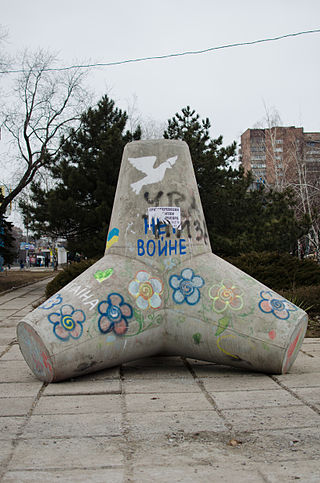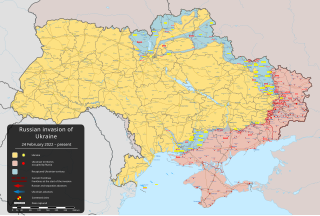
The Ministry of Internal Affairs of Ukraine is the ministry of the Ukrainian government that oversees the interior affairs of Ukraine. The ministry carries out state policy for the protection of rights and liberties of citizens, investigates unlawful acts against the interest of society and state, fights crime, provides civil order, ensures civil security and traffic safety, and guarantees the security and protection of important individuals. It is a centralised agency headed by the Minister of Internal Affairs. The ministry works closely with the office of the General Prosecutor of Ukraine. It oversees the National Police of Ukraine, National Guard of Ukraine (gendarmerie), the State Emergency Service of Ukraine, State Border Guard Service of Ukraine and the State Migration Service.

The State Border Guard Service of Ukraine is the border guard of Ukraine. It is an independent law enforcement agency, organized by the Constitution of Ukraine as a military formation, the head of which is subordinated to the President of Ukraine.

The European Union Rule of Law Mission in Kosovo, known as EULEX Kosovo or simply as EULEX, is the largest civilian mission ever launched under the Common Security and Defence Policy (CSDP) of the European Union. EULEX supports selected Kosovo rule of law institutions on their path towards increased effectiveness, sustainability, multi-ethnicity and accountability, free from political interference and in full compliance with international human rights standards and best European practices.

Arsen Borysovych Avakov is a Ukrainian statesman and politician of Armenian origin. Minister of Internal Affairs of Ukraine in 2014–2021. Member of Parliament of Ukraine (2012–2014), Chairman of the Kharkiv Regional State Administration (2005–2010), Member of the National Security and Defense Council of Ukraine, Member of Euro 2012 Organizing Committee (2007). Member of the National Union of Journalists of Ukraine. Honored Economist of Ukraine (2007).

The European Union Capacity Building Mission in Niger. is a civilian capacity-building mission in Niger, launched by the EU in 2012 under its Common Security and Defence Policy (CSDP). Since 5 June 2023, the German judge Katja DOMINIK has been Chief of Mission.

EUPOL Afghanistan (2007–2016) was a European Union mission supporting the reform efforts of the Afghan government in building a civilian police service in Afghanistan.

From the end of February 2014, demonstrations by Russian-backed, pro-Russian, and anti-government groups took place in major cities across the eastern and southern regions of Ukraine in the aftermath of the Euromaidan and the Revolution of Dignity, which resulted in the ousting of Russian-leaning President Viktor Yanukovych. The unrest, which was supported by Russian military and intelligence, belongs to the early stages of the Russo-Ukrainian War.

The National Guard of Ukraine is the Ukrainian national gendarmerie and internal military force. It is part of the Ministry of Internal Affairs, responsible for public security. Originally created as an agency under the direct control of the Verkhovna Rada on 4 November 1991, following Ukrainian independence, it was later disbanded and merged into the Internal Troops of Ukraine in 2000 by then-President Leonid Kuchma as part of a "cost-saving" scheme. Following the 2014 Revolution of Dignity, amidst the Russian intervention, the National Guard was re-established, and the Internal Troops were disbanded.

The Armed Forces of Ukraine are the military forces of Ukraine. All military and security forces, including the Armed Forces, are under the command of the President of Ukraine and subject to oversight by a permanent Verkhovna Rada parliamentary commission. They trace their lineage to 1917, while the modern armed forces were formed after Ukrainian independence in 1991.

The Azov Assault Brigade is a formation of the National Guard of Ukraine formerly based in Mariupol, in the coastal region of the Sea of Azov, from which it derives its name. It was founded in May 2014 as the Azov Battalion, a volunteer paramilitary militia under the command of Andriy Biletsky to fight pro-Russian forces in the war in Donbas. It was formally incorporated into the National Guard on 11 November 2014, and redesignated Special Operations Detachment "Azov", also known as the Azov Regiment. In February 2023, the Ukrainian Ministry of Internal Affairs announced that Azov was to be expanded as a brigade of the new Offensive Guard.
The National Police of Ukraine, often simply referred to as the Politsiia, is the national, and only, police service of Ukraine. It was formed on 3 July 2015, as part of the post-Euromaidan reforms launched by Ukrainian president Petro Poroshenko, to replace Ukraine's previous national police service, the Militsiya. On 7 November 2015, all the remaining militsiya were labelled "temporary acting" members of the National Police.

A rocket attack on Mariupol was launched on 24 January 2015 by Russian and pro-Russian forces against the strategic maritime city of Mariupol, defended by Ukrainian government forces. Mariupol had come under attack multiple times in the previous year in the course of the War in Donbas, including in May–June 2014, when the city was under the control of Russian controlled forces; and in the September 2014 offensive.
The following is a list of events from the year 2022 in Ukraine.

On 24 February 2022, Russia invaded Ukraine in an escalation of the Russo-Ukrainian War that started in 2014. The invasion was the biggest attack on a European country since World War II. It is estimated to have caused tens of thousands of Ukrainian civilian casualties and hundreds of thousands of military casualties. By June 2022, Russian troops occupied about 20% of Ukrainian territory. About 8 million Ukrainians had been internally displaced and more than 8.2 million had fled the country by April 2023, creating Europe's largest refugee crisis since World War II. Extensive environmental damage caused by the war, widely described as an ecocide, contributed to food crises worldwide.

Since the beginning of the Russian invasion of Ukraine in 2022, the Russian military and authorities have committed many deliberate attacks against civilian targets, massacres of civilians, torture and rape of women and children, torture and mutilitation of Ukrainian prisoners of war, and indiscriminate attacks in densely populated areas.

During the Russian invasion of Ukraine, Russian authorities and armed forces may have committed war crimes by carrying out deliberate attacks against civilian targets and indiscriminate attacks in densely-populated areas. The United Nations Human Rights Monitoring Mission in Ukraine says the Russian military exposed the civilian population to unnecessary and disproportionate harm by using cluster bombs and by firing other weapons with wide-area effects into civilian areas, such as missiles, heavy artillery shells and multiple launch rockets. As of the beginning of July 2023, the attacks had resulted in the documented deaths of between 9,300 and 16,500 civilians. On 22 April 2022, the UN reported that 92.3% of civilian deaths were attributable to the Russian armed forces.
This timeline of the Russian invasion of Ukraine covers the period from 24 February 2022, when Russia launched a military invasion of Ukraine, to 7 April 2022 when fighting focused away from the north and towards the south and east of Ukraine.
The European Union Advisory Mission in Iraq was established by the European Union Member States in 2017 following a request by the Government of Iraq to support its national Security Sector Reform (SSR) efforts.














